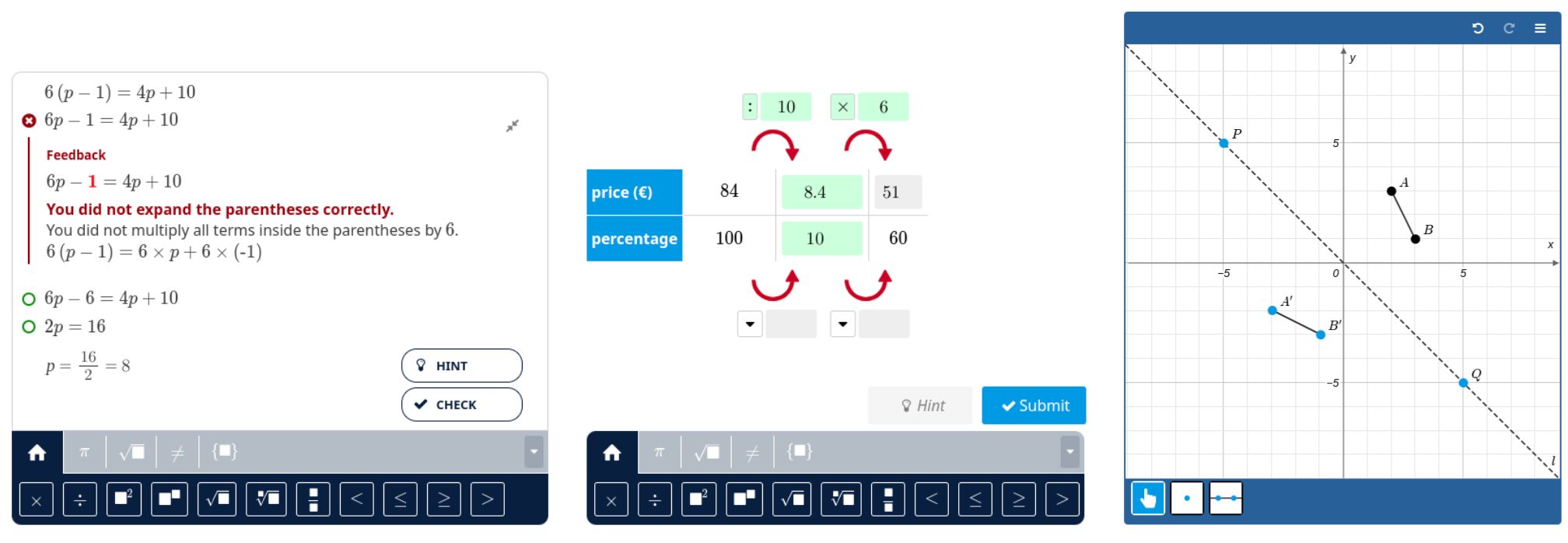Why Algebrakit?
The challenges of online mathematics
Mathematics combines various subjects, such as algebra, geometry, probability, calculus, and arithmetic. Each of these fields has its way of notations and approaches, such as writing a mathematical expression or derivation, drawing a graph, number line, or table. Performing these activities in an online environment is a challenge. Algebrakit offers a range of question types that handle each of these activities.

A fundamental challenge is that mathematics is more about logical reasoning than root knowledge. Students need to show their thinking when solving problems. And if they make a mistake, we want to discuss the incorrect step instead of just signaling that the answer is wrong. That is what a good teacher would do, and it is what an online math solution should offer as well.
That is why Algebrakit's question types use didactical engines, which are complex algorithms capable of sub-step evaluation. They can also offer help by generating personalized hints and error feedback.
The benefits
An e-learning system that offers personalized instructions to students is called an Intelligent Tutoring System (ITS) and offers numerous benefits.
For students:
- 24/7 support. Although nothing beats the attention of a teacher or a capable family member, an intelligent tutoring system can often provide enough support to help students resolve difficulties. Access to human support is limited and not equally available to all students. A digital system is always ready and never impatient.
- Experiencing success. There is nothing more frustrating than "getting it wrong". A system that helps students solve problems by themselves is far more motivating. The number of students suffering from 'math anxiety' proves this is important.
- Unlimited practice. Procedural skills are essential to relieve working memory and free the mind to build conceptual understanding. An e-learning system can offer new random questions for practice until the student fully masters the skill.
For teachers:
- Efficient use of classroom time. Students often need help with topics they should have mastered already. Time spent rehearsing previous theories or resolving small mistakes reduces the time for teaching new knowledge or building a deeper understanding.
- Automated scoring. Automatic evaluation and scoring take away a significant burden for teachers. It also opens the door to more formative tests to give teachers and students a better insight into current understanding.
For authors:
- Support different solution paths. There are often many ways to solve a math problem. Anticipating every possible step or every other notation for a correct answer is impractical. A system that automatically recognizes equivalent expressions or strategies makes this process much more efficient.
- Detect mistakes. Predicting mistakes is even more difficult than predicting correct steps. Teachers know that students often make the same type of mistakes. A system that knows these common mistakes can generate personalized error feedback without requiring authoring work. Also, recognizing such mistakes offers valuable information to guide instruction.
Scope, coverage, and language
Algebrakit applies to a broad range of mathematics, from multistep arithmetic and pre-algebra up to (basic) calculus. Algebrakit is less suited for early primary mathematics, as it requires a more playful presentation and relies less on multi-step problems. We currently do not support advanced calculus, such as multivariate integration or differential equations.
Algebrakit can support different languages. We currently support English, Spanish, French, Dutch, and German. We will add new languages when needed.
There are differences in the math curriculum between countries. And within the same curriculum, different notations and strategies are used between lower and higher grades. We can configure such requirements in so-called student profiles.
What Algebrakit is not
Algebrakit is not an end-user application but a component that offers mathematical capabilities to existing learning programs. Students never log in to Algebrakit but work with Algebrakit questions right from the learning application.
Algebrakit does not receive or need any personally identifiable information. Also, Algebrakit does not offer courses or pre-built content. Instead, it provides the technology you can use to create your learning material.
